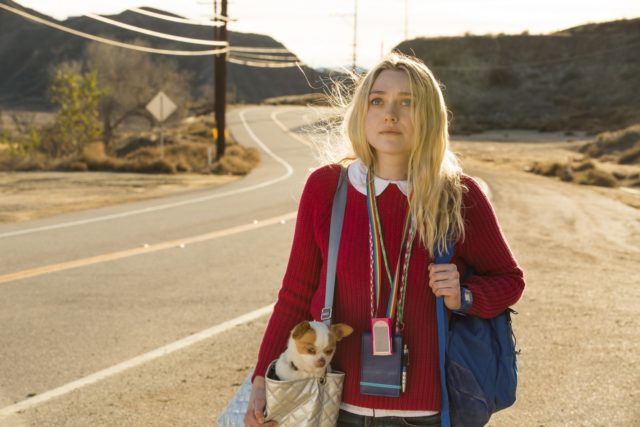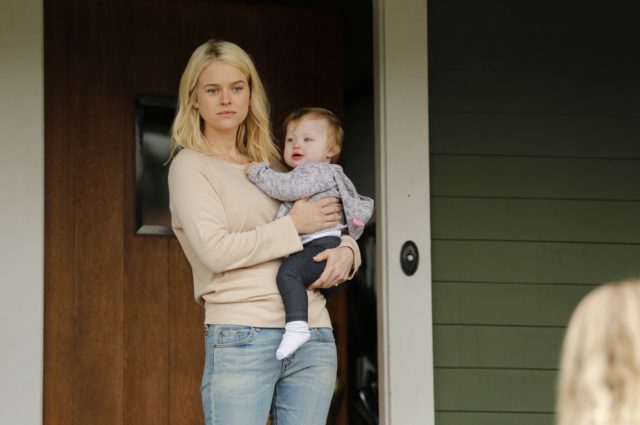Next week is the premiere of Please Stand By, a film about a young woman with autism who goes on a journey from the safety of her group home to deliver her Star Trek script to a competition at Paramount Pictures. The film was written by Michael Golamco and based on his short play of the same name.
While Please Stand By is character-based indie film, Michael Golamco is no stranger to genre. He has inserted nerdy elements into his work as a playwright, including Dungeons and Dragons and futuristic computer AI. He was also a writer on the NBC series Grimm and is currently working on the upcoming Syfy science fiction horror series Nightflyers, based on work by George R.R. Martin. TrekMovie had a chance to talk to the writer about his new movie and what Star Trek means to him.
A Trek fan writing about a Trek fan’s journey
Can you talk about the original inspiration for your play, which you then turned into a screenplay for this movie?
I read this article in The New York Times Magazine back in 2007 called “What Autistic Girls Are Made Of.” It focused on this summer camp for kids with autism and particularly the girls. There were two takeaways for me from that. One was that girls with autism still have this emotional need to connect with people and with the condition making it difficult to pick up social cues, [it] kind of makes it a double whammy for girls because it is difficult to socialize properly. And they need those emotional connections. Autistic boys and men have been dealt with a lot in popular culture like with Rain Man and now with The Good Doctor and it is kind of more socially acceptable for boys to be awkward and weird, but for girls it is harder.
The second thing was that one of the girls in the article wrote fan fiction, specifically Lord of the Rings fan fiction, and I loved that so much, because it is what we do. We do storytelling and so the character emerged from that. The play was a short one-act play that is essentially the first act of the movie. In it we establish the three main characters: Wendy and her caregiver Scottie and her sister Audrey. By the end of that one-act play Wendy goes off on her journey and that is where the play ends, so we don’t know what happens. The response to the play was fantastic and so I thought we had something, so I expanded it to a feature. I kind of wanted to see what happens to her out there.
Your Wendy writes Star Trek fan fiction instead of Lord of the Rings. I know you have genre connections, so are you a big fan? Do you consider yourself a Trekkie?
I love Star Trek! It is something I think about a lot. When I was a kid The Next Generation was out, and I watched TOS, but TNG was my show. Star Trek has been around for so long but the series that defines Trek for you is the one you first discover and for me that was TNG. I have always been a fan and it has always influenced me in my genre work. On Nightflyers we talk about Star Trek all the time. Terms like “red shirt” are part of our culture and so we use those as a shorthand to get ideas across. I often refer back to individual TNG episodes to pitch ideas or to communicate ideas.
It is something that has been part of my creative DNA since I was a kid and that still influences me today. I am rabid with anything Trek that comes out, I want it right away.
Connecting through Star Trek
Do you see a connection for people on the spectrum to fandom or fan fiction?
With reading about autism and talking to them, there is this idea of the “special interest.” It is something that you are really interested in that you love. It could be a piece of fiction. You find something that speaks to you on a gut level and you get really interested in it.
Everyone is different. Autism presents differently in different people. What a lot of people with autism are seeking is a sense of calm and something they can focus on and enjoy. Great stories are a sense of calm. That is a universal aspect. Once you get absorbed in a story, you start to unpack it and want to make it your own and try things. It is a way of widening people’s imaginations and paying homage to the stories that really made this who we are. So, there is a powerful component there for people with autism and everyone else.
Wendy seems particularly drawn to the character of Spock. Is there something about Spock that draws in people who feel different?
Absolutely. The way that Spock was presented in TOS was that he was the only alien on the crew. Keep in mind he is half-human and dealing with that a lot. It’s also true of Worf. These two characters are real ambassadors for their cultures and really believe in them and espouse them because they are in contact with humans. So, they give you the sense of the other, and that was fascinating for the 1960s when Trek came out. Not only are the Russians and Sulu on this ship and representatives of the other, but there is also this alien, Spock, who is the ultimate other.
So, I feel that the condition of autism makes you feel a little alienated, no pun intended. You feel separate from humanity. For me, I am not on the spectrum, but there have been plenty of moments when I felt alienated from humanity or felt apart. And Spock’s story and his character and how he was treated in the show and in popular culture and how revered he is gives me a great deal of comfort. It makes me feel it is going to be okay.
I think Gene Roddenberry had it absolutely right back then. Infinite Diversity in Infinite Combinations. He created a character that is an iconic representation of being different and I think a lot of people gravitate towards that.
This film is about both Wendy’s actual journey to deliver a script to Paramount, but also her journey to be able to connect to people. For Wendy, is her Star Trek fandom something that helps her connect, or is it a safe space to retreat?
I think it is both of those things. Initially, it is a place of safety and comfort. She watches and devours Star Trek. But, once she starts creating her own, it is like writing a message. Once you start to write a story, it has got to be told. Somebody has got to hear it. So, you go from consuming and absorbing, to creating and releasing it into the world. Which is what all of us as writers do and to do that you have to go out into the world. So, it is a transformation from being a listener to a speaker. So, telling that story is what allows Wendy to open up and become more than what she was before.
Star Trek connections to ‘Please Stand By’
There is a character in the movie, Frank the Trekkie cop, and it seems written for Patton Oswalt. Was his casting kismet or planned?
It was kismet. When I was thinking of that character it was the idea that when you are feeling alienated and alone, along comes somebody who shares your interest and understands you and is able to communicate with you in a way that no other character in the movie can. When I found out Patton agreed to do it and was pumped about it, it felt like, “Wow!”, I am a huge fan of his. That scene is my favorite in the movie.
Do you know if Alice Eve’s casting as Wendy’s sister was related to her connection to Star Trek?
I’m not sure, that is more a question for Ben Lewin, the director. But, obviously that meta aspect of it is super fun. Like in the movie she says, “Star Trek? That is interesting” and a piece of the Trek universe with a meta flow into the story which is cool. And she is such a great person and great to work with.
What involvement if any was there with Paramount or CBS?
As far as I know, the only clear directive was you had to get everything absolutely correct. So, with the Klingon we brought on somebody from the Klingon Language Institute and he did a great job translating. When I wrote the script, I used Bing Translation to Klingon and I got one of my favorite emails of my life from the Klingon language expert saying “Okay, all the lines you have written are totally wrong.” He made recordings for how things should be said for Patton and Dakota, and that was dope as hell. His mandate was “get this shit right.” And for a character that loved Trek so much, we needed to do that.
In theaters next week
Please Stand By will be released January 26 in theaters and on demand via Amazon Video and iTunes. For more info or to buy tickets, visit pleasestandbyfilm.com.
Exclusive clip
Trailer











Star Trek Inspired Generations of people, its a pity Discovery has abandoned this. Discarded everything that made Star Trek a light in peoples lives, it was unique, more than a silly or dystopian sci-fi series.
What will the next generation be inspired by? Re-Runs I guess…
As a parent with one child out of the house and another on his way, the line “people have their own lives…and after awhile those lives don’t include you,” hits pretty close to home.
I saw this film about a month ago. Dakota Fanning is amazing, as is the supporting cast. Superb film! Can’t wait for the rest of the world to see it!!
I’m going to say something that I suspect many people will feel but few will be brave enough to say it. While this movie looks like it’s going to be well-made, touching, and the interview with the writer shows his Star Trek cred, there is one big problem.
My whole life I have had to deal with the stereotyping of being a Star Trek fan- that Trek fans are nerds, socially awkward, social losers, and appropriate targets to be made fun of. Decades ago it bothered me a lot. I don’t feel hurt anymore by it, but I remain frustrated. Usually it is by people who know nothing about Star Trek except what they see on TV, which is often the most unusual people, instead of the typical fan. After all, if you want good ratings, you don’t interview and show socially normal, intelligent, kind people- that would be boring.
So this may be a great movie, but like Sheldon in “Bing Bang Theory” it’s going to just further strengthen the stereotype in the public’s eye, that to love Star Trek you must have social deficits. Don’t get me wrong, I personally am very accepting of people of all types, including those on the spectrum. I am talking about dealing with social stereotypes that, wrong-headed as they are, affect people.
I struggle to find the words, GarySeven…. I struggle.
I feel genuine sorrow that you feel this story, or stories like it, will ruin your street cred as a Star Trek fan. I, as a writer and Trek fan struggling with bipolar disorder, actually found strength and love in what I saw. Both Star Trek fandom and mental illness seem to be handled here with the utmost love and reverence.
I don’t know what I really want to prove here. I just think it’s sad that your value as a Star Trek fan is threatened by stories of underdogs who love what you love.
I’ll shut up now, as my point isn’t to get shouted down by people who disagree with me from the comfort of their homes or coffee shops. I just felt I had to speak up on this comment because, well, isn’t the point of Star Trek to tell stories from a multitude of different view points. IDIC, after all. IDIC.
Peace be with you, GarySeven.
Y’know … we ST fans are deep thinkers aren’t we?
Yes … I also understand GarySeven’s perspective having lived thru similar interpersonal interactions and observations these last 4+ decades as a Star Trek fan … And Telly1701’s reflections are a beautiful reminder that I can value my love for this show and not be frustrated by others who are limited by their own fears and assumptions – because that’s what it is, I think. These people are on their own journey and I believe my interactions with them over the years has made Star Trek even “realer” for me. Thank you both for your insights.
And in response to to Trekboi’s comment, it’d be hilarious if the “D” in IDIC was replaced with “Discoveries”. Maybe a conversation for another time. 😊